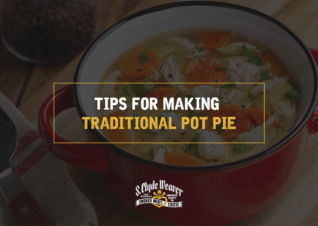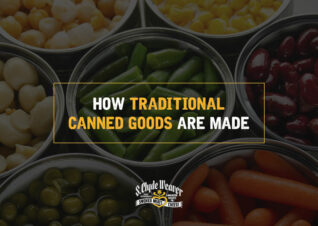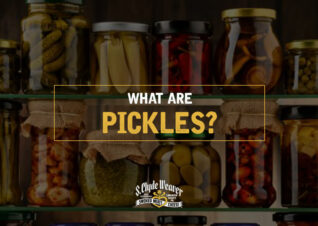
When you run out of a favorite product, you probably go out to re-stock with only the product in mind — and not so much where you’ll get it. But did you know that where you buy your products can matter just as much as the products themselves?
While there’s nothing wrong with buying products from a national retailer, many of us don’t stop to think about where our money is actually going — except out of our pockets, never to be seen again. But what happens when we buy goods and services from local businesses in our communities? More than most people think! Learn about why buying local is so important — and beneficial.
Why Buy Local?
Buying local benefits you, your neighbors and the environment. Every local purchase can have a huge ripple effect. When you buy local food products, you’ll notice immediate and long-term perks. Choosing to support local farmers and food suppliers could offer you many different advantages. The positive impacts of buying local start with you, the buyer. Before exploring the broader effects of local purchases, consider how your shopping choices influence you. Reasons to buy local include the following:
Better Product Quality
When you buy or eat local products, you know the food on your plate didn’t have to travel 300 miles to get there. Local food products are fresher and more nutritious — not to mention tastier — than products that have spent time in transit, packaging and storage for days on end. The food products you find at farmer’s markets and local shops are bound to be fresher than those in larger retailers.
When produce has to travel to a faraway retailer, the farmers must pick it early, before its peak ripeness. On the other hand, local food sellers are able to harvest their produce at the right moment, resulting in a better taste. In addition to tastier produce, you’ll also find hand-crafted cheeses and meat treated with careful quality control when you buy local.
Product quality is about more than taste. Local food products are also extra nutritious. As food sits in storage or transit, it loses its nutrients. By the time it gets to you, it’s unlikely to have the same health benefits. If you want to make your taste buds happy and improve your diet, buy local.
Clearer Sources
When you buy local, you’re more likely to know where your food comes from and what’s involved with its creation. You can ask about the pesticides used in produce production or the feeding routines used in meat production. Knowing details about where your food comes from gives you a chance to make healthier choices.
Fun Experiences
Buying local also offers a better customer experience. Local markets are often fun environments, full of friendly people, live music, free samples and activities. While buying from a chain grocery store is an impersonal and, frankly, rather boring activity, buying from local retailers can be exciting and fun.
Building Connections
Shopping for local products closes the gap between the consumer and the farmer or manufacturer, which enables you to build buyer-seller trust. You can get to know the people producing and selling the food you eat. Conversations with the seller may give you an opportunity to learn about food production — the seasons, the processes and the local environment.
Saving Money
Despite popular assumptions, local food products can be less expensive than those in grocery stores, especially if you’re seeking organic or high-quality products. Since the food in the grocery store requires packaging and shipping, it can be pricier to put on the shelf.
The Impact of Buying Local
Buying local meat, produce and other food products can help you eat healthier, stay informed and save money. It also has larger impacts on those around you, benefiting the local economy and environment. Each time you support local food producers and sellers, you help build a healthier local economy, stronger community and more sustainable environment.
Impact on Your Local Economy
Supporting local businesses boosts your local economy. When you buy local, you’re funneling money back into the community rather than ambiguous national chains and corporations. Circulating money within your own community funds public infrastructure — things like schools, libraries, roads and parks. Local businesses also provide jobs and wages to residents and contributions to charitable nonprofits.
Small businesses are vital to the nation’s economy. The 30.7 million small businesses in the United States employ about half of the private workforce. A booming local market encourages business entrepreneurs to establish their companies in the community. It’s a win-win all around!
Impact on Your Community
Your shopping choices impact your community beyond its economy. In a more abstract sense, strong local businesses give a community a distinctive character. A town’s one-of-a-kind shops make it unique and special. They attract visitors and offer a sense of self-identity and pride for the residents. While large chain retailers homogenize towns, local businesses strengthen and diversify communities.
Supporting small businesses also gives you a chance to get to know your neighbors, and those connections may come in handy down the road. Local commerce is a fantastic way to network with others in your community and foster appreciation for the local industry and culture.
Impact on the Environment
When it comes to local food products, the environmental benefits are significant. Some of the ways local food products help the environment include:
- Decreasing carbon emissions: Transporting products long distances eats up fossil fuels. Since local products don’t need to travel far, they help reduce carbon emissions.
- Decreasing pollution and waste: Since local products need little transport, they require far less packaging than products shipped across the country. The lighter reliance on packaging helps decrease pollution and landfill waste.
- Encouraging diversity: Large-scale production limits diversity because plants and animals must have uniform qualities, like the ability to survive transport. Smaller farmers are able to produce a wider variety of crops and livestock. Diversity makes your plate interesting, and it promotes a healthier ecosystem.
These positive environmental impacts will help create a more sustainable future. Some of the reasons to make good choices for the environment include:
- Promoting food security: Sustainability helps secure resources. Supporting sustainable practices, like buying local food, helps protect the future for everyone.
- Promoting public health: Decreasing carbon emissions and pollution promotes public health. Your local purchases make for a healthier and safer society.
- Promoting healthy natural balances: Plant and animal diversity creates the balance that ecosystems need to thrive. Small, local farms are better equipped to preserve natural diversity.
Why Buying Local is Important
Buying local is important for all kinds of different reasons. You might decide to buy local because it’s:
- Better for you: Buying local food is healthier, tastier, more fun and often less expensive.
- Better for your neighbors: When you buy local, you support your neighbors. You help create jobs, fund public infrastructure and build a stronger, healthier community.
- Better for the environment: The benefits reach beyond your community, helping promote a sustainable and safer environment by reducing carbon emissions and waste.
Buy Local in Lancaster, PA, With S. Clyde Weaver
There are many reasons to buy local, some of which might not be obvious at first. If you’re looking for a way to give back to the Lancaster community and experience local business quality and hospitality, check out S. Clyde Weaver’s wide selection of locally produced goods like meats, cheeses and snacks!













